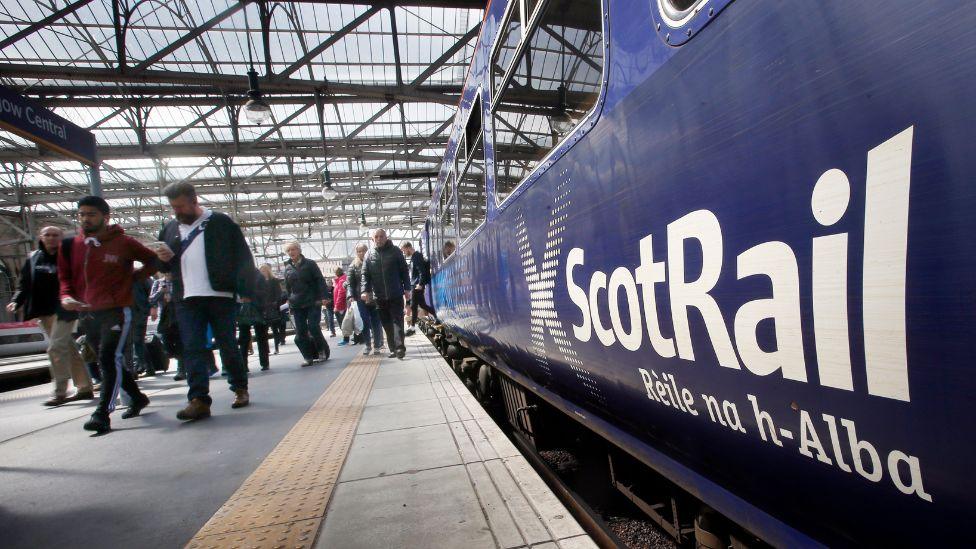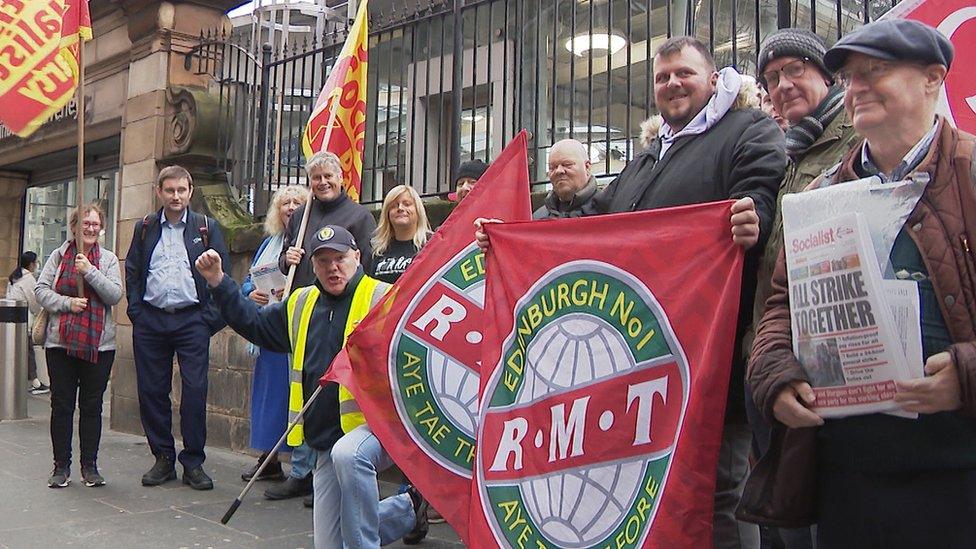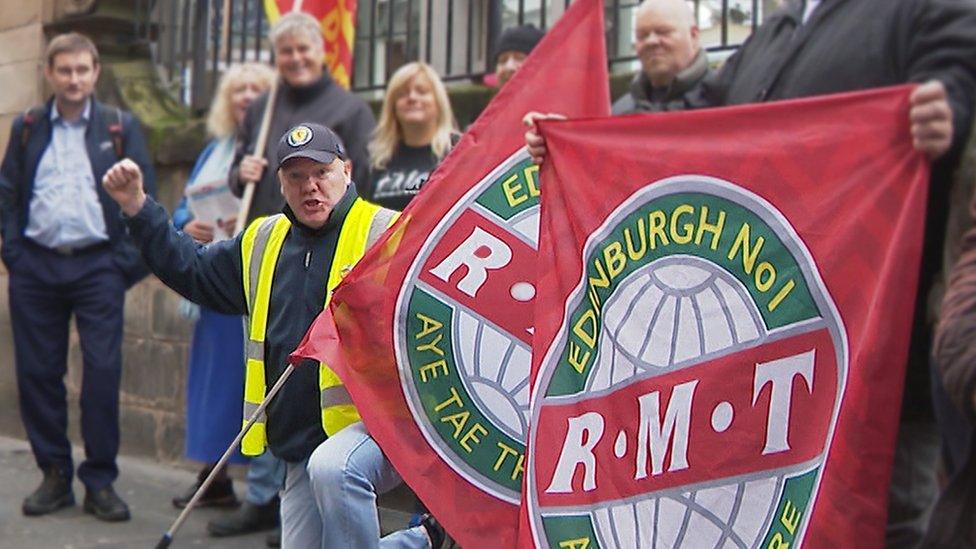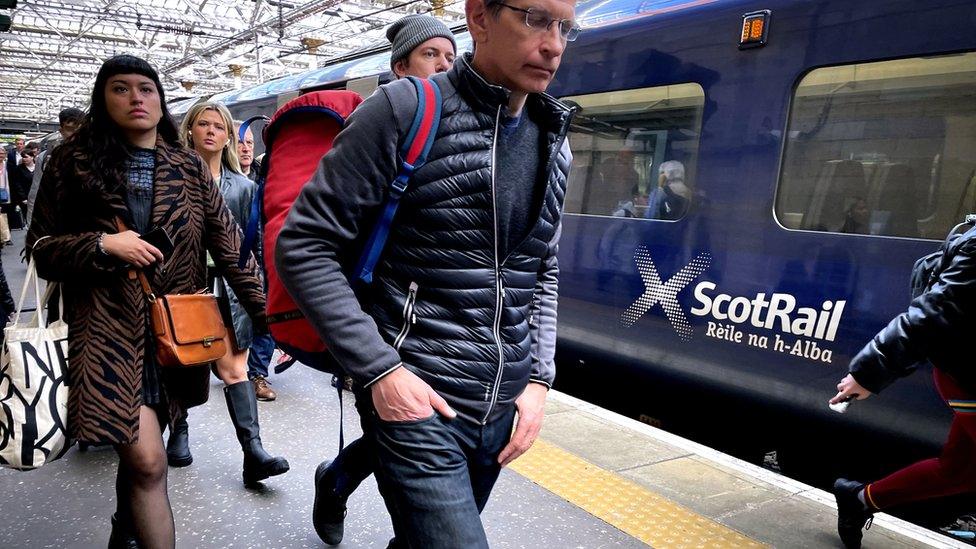RMT to escalate ScotRail strike action ahead of Christmas
- Published

ScotRail services are set to come to a halt on the day of a major international rugby match
Rail workers are to intensify their strike action ahead of Christmas in a pay dispute with ScotRail.
The RMT union has announced plans for a walkout on the day of Scotland's rugby international against Argentina on 19 November and on every Friday and Saturday after that until Christmas.
The union's organiser in Scotland, Mick Hogg, told the BBC action was designed to "focus minds to find a solution".
ScotRail said the move would be "incredibly disappointing".
The firm had offered all staff a 5% pay uplift plus add-ons, with the lowest paid workers offered a 7.5% increase.
However, that deal has since been withdrawn after the RMT refused to cancel a strike last Saturday which crippled the network, with a limited service running on only three routes in the central belt.
It was the second one-day strike the RMT has held in the dispute, with the union previously saying it would "seriously consider" an 8.2% increase.
A ban on overtime and rest day working is also in place.
More than 2,000 ScotRail workers are involved in the dispute, including conductors, ticket inspectors, depot staff, cleaners, CCTV operators and catering workers.


This is a significant escalation of the strike action at ScotRail.
The prospect of 48 hour strikes on Fridays and Saturdays in the run up to Christmas is something of a nuclear option and risks hitting festive nights out and shopping trips.
The union will be hoping the simple prospect of action on this scale will focus minds on resolving the dispute. But can a significantly improved pay offer be made?
While ScotRail staff are not paid out of taxpayers' money in the way that, say, NHS workers are, there is still the question of ensuring that the taxpayer gets the most value from the money the Scottish government gives ScotRail.
ScotRail was, in effect, renationalised by the Scottish government in April. Will the prospect of massive disruption lead to further political pressure for a solution?
Or will the RMT simply be told that there can be no significant improvements to the current offer?

Rail services have also been severely disrupted in recent months by a series of separate disputes with workers including ScotRail drivers - which has been resolved - and Network Rail staff.
ScotRail head of customer operations Phil Campbell, said: "We've had no formal confirmation yet from the RMT, but if what is being reported is accurate it is incredibly disappointing and will severely impact our customers, our staff and the economy in the lead up to Christmas.
"ScotRail made a significantly improved offer to the RMT, which would deliver a 7.4% basic pay increase for the lowest paid, provide job security for at least six years, and increase allowances and commission payments. It's time for the RMT bosses to give members a say and put it to a referendum.
"Once we have formal notification of any further action, we will assess the full impact of this strike action and will begin working on contingency arrangements."

RMT members were on strike in Edinburgh last weekend
Retail bosses warned that strike action in the approach to Christmas would "make life even tougher" for businesses.
David Lonsdale, director of the Scottish Retail Consortium, said: "This is the critical trading period of the year for many retailers in our city centres who were clobbered by the exodus of commuters during the pandemic.
"Further train disruption could deter shoppers and derail retail's recovery. It is imperative both sides in the dispute get back round the table and thrash out a solution immediately."
The Scottish government said it respected the democratic right of union members to take industrial action.
But a spokesman added: "It is really disappointing, however, that union leaders continue to deny their members a referendum on the latest pay offer, one which would benefit lower paid ScotRail workers in particular.
"Even more disappointing is this latest threat of additional strikes in the lead up to Christmas particularly as this will not lead to any increased pay offer.
"If carried out, these strikes would potentially leave RMT members far worse off at a time when many will already feel the impacts of the costs crisis."
Related topics
- Published29 October 2022

- Published28 October 2022
